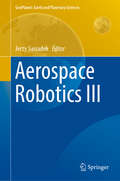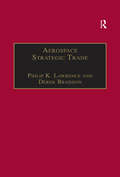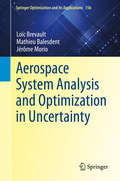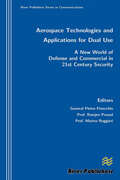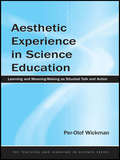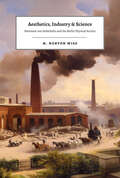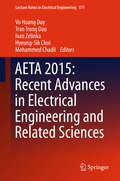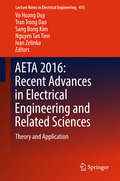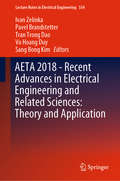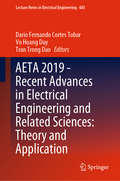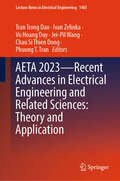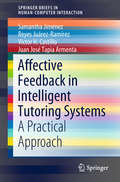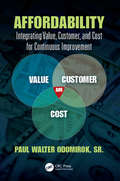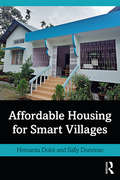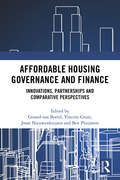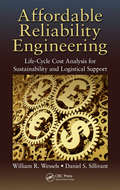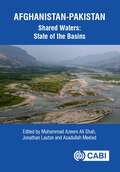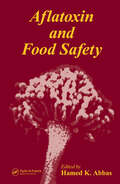- Table View
- List View
Aerospace Robotics III (GeoPlanet: Earth and Planetary Sciences)
by Jerzy SasiadekThis book includes extended versions of original works on aerospace robotics presented at the Conference on Aerospace Robotics (CARO) in Warsaw. It presents recent advances in aerospace robotics, such as manipulators, which are widely used in space for orbital operations, for example, the Mobile Servicing System on the International Space Station and the Shuttle Remote Manipulator System. Such manipulators are operated by astronauts and mounted on large platforms, making the influence of manipulator motion on the state of the platform insignificant. Application of manipulators for capture maneuvers in unmanned On-Orbit Servicing or Active Debris Removal missions requires reliable control algorithms that take into account the free-floating nature of the manipulator-equipped spacecraft. As such the book presents possibilities for using space manipulators for exploration and a variety of space operations. Further, it discusses new methods for the control of autonomous unmanned aerial vehicles (UAV) using vision systems and sensor fusion methodologies. Such autonomous flying vehicles could be used for materials deliveries and emergencies, as well as surveying and servicing.
Aerospace Strategic Trade: How the US Subsidizes the Large Commercial Aircraft Industry
by Philip K. Lawrence Derek BraddonThe U.S. economy is generally considered to run on free market or laissez faire principles, implying that U.S. policy makers do not provide government support for industrial or commercial sectors. While mostly true, it is not the case with strategic industries, such as aerospace. Support for the aerospace sector has been viewed as essential, because aerospace technologies have been the material backbone of U.S. security systems. But American historic dominance in commercial aerospace, and particularly the large commercial aircraft sector, arose on the back of defence technology paid for by the US government. Aerospace Strategic Trade analyses the subsidy of the U.S. large commercial aircraft (LCA) industry and redefines the terms of the Airbus/Boeing subsidy debate. This is achieved by tracking the benefits to Boeing, of the Research and Technology contracts granted by the DoD and NASA. The book is characterized by a new level of methodological precision in the database upon which the factual claims rest and the analysis derives from an exhaustive search of U.S. public databases and also data on federal R&D contracts, obtained under the Freedom of Information Act (FOIA) in the USA. The overall analysis brings together these two approaches and provides a balanced and highly informative account of U.S. federal funding of the American large commercial aircraft sector. This book is of interest to academics, industrialists and government officials concerned with the aerospace industry, to managers and executives in the aerospace industry.
Aerospace System Analysis and Optimization in Uncertainty (Springer Optimization and Its Applications #156)
by Loïc Brevault Mathieu Balesdent Jérôme MorioSpotlighting the field of Multidisciplinary Design Optimization (MDO), this book illustrates and implements state-of-the-art methodologies within the complex process of aerospace system design under uncertainties. The book provides approaches to integrating a multitude of components and constraints with the ultimate goal of reducing design cycles. Insights on a vast assortment of problems are provided, including discipline modeling, sensitivity analysis, uncertainty propagation, reliability analysis, and global multidisciplinary optimization. The extensive range of topics covered include areas of current open research. This Work is destined to become a fundamental reference for aerospace systems engineers, researchers, as well as for practitioners and engineers working in areas of optimization and uncertainty. Part I is largely comprised of fundamentals. Part II presents methodologies for single discipline problems with a review of existing uncertainty propagation, reliability analysis, and optimization techniques. Part III is dedicated to the uncertainty-based MDO and related issues. Part IV deals with three MDO related issues: the multifidelity, the multi-objective optimization and the mixed continuous/discrete optimization and Part V is devoted to test cases for aerospace vehicle design.
Aerospace Technologies and Applications for Dual Use
by Ramjee Prasad Giacinto Losquadro Hugh Griffiths Marina Ruggieri S. Greco Alexander Soucek Albena Mihovska General Pietro Finocchio Pietro Finocchio Giuseppe Morsillo Mario L. Cosmo Paul E. Gartz Gerardo Lancia G. C. Grasso Enrico Saggese S. Venturi P. Massafra K. P. Doerpelkus Carlo Alberto Penazzi Renzo Meschini Armando Buccheri Marco Tommasi Giovanni Guidotti Nunzio Cocco Marina Grossi Daniele Mortari Carlo Des Dorides Mario Ciampini S. Vetrella L. Verde U. Ciniglio F. Corraro Andrea De Martino Sergio Attilio Jesi Volker Liebig Giuseppe Veredice Ole Mørk Lauridsen L. Pasquali Massimo Capaldo Vittorio Dainelli Cosimo La Rocca Alexander Mager Tiziano Sassorossi S. Arenaccio G. Chiassarini R. Loforti F. Petrosino A. Vernucci Claudio De Bellis Michel Feuga Elisa Tonello Domenico D'Angelo Mesut CicekerThe events occurred in the last years have shown how the threat related to both intentional and natural disasters could bring the civil and the military worlds closer in the conceivement and deployment of countermeasures as well as in the identification of effective strategies for enhancing the Planet safety and security. In this frame, the concept of dual use ? the set of technologies and applications that can be exploited for both civil and military purposes - becomes a key-topic. In addition, the aerospace is a strategic building block in the deployment of a network centric environment that aims at the global protection of the mankind. Aerospace is also a natural environment for dual use: many of the related enabling technologies have been first developed for the military world and then applied to civil ? including commercial - purposes.On September 12-14, 2007 an International Symposium has been held in Roma, Italy, joining the dual use approach with the aerospace technology: the international community has been gathered around the key-topic: aerospace technologies and applications for dual use. The event has called experts and operators from the military and civil community, belonging to industry, scientific and governmental institutions. The common aim was an effective convergence between the available and perspected technologies for the civil and military worlds as well as the conceivement of applications that can take the maximum benefit from the dual approach, optimizing the available economic resources. The Symposium has included invited-only contributions and an industrial panel. The main results of the Symposium, derived from key-note speeches, invited lectures, panel discussions and conclusions have created the starting material to develop this Edited Book.
AeroStruct: Contributions to the Closing Symposium of the German Research Initiative AeroStruct, October 13–14, 2015, Braunschweig, Germany (Notes on Numerical Fluid Mechanics and Multidisciplinary Design #138)
by Ralf HeinrichThis book reports on the German research initiative AeroStruct, a three-year collaborative project between universities and the aircraft industry. It describes the development of an integrated multidisciplinary simulation environment for aircraft analysis and optimization using high-fidelity methods. This system is able to run at a high level of automatism, thus representing a step forward with respect to previous ones. Its special features are: a CAD description that is independent from the disciplines involved, an automated CFD mesh generation and an automated structure model generation including a sizing process. The book also reports on test cases by both industrial partners and DLR demonstrating the advantages of the new environment and its suitability for the industry. These results were also discussed during the AeroStruct closing Symposium, which took place on 13-14 October 2015 at the DLR in Braunschweig, Germany. The book provides expert readers with a timely report on multidisciplinary aircraft design and optimization. Thanks to a good balance between theory and practice, it is expected to address an audience of both academics and professional, and to offer them new ideas for future research and development.
Aesthetic Experience in Science Education: Learning and Meaning-Making as Situated Talk and Action (Teaching and Learning in Science Series)
by Per-Olof WickmanThis book examines the role of aesthetic experience in learning science and in science education from the perspective of knowledge as action and language use. The theoretical underpinnings are based on the writings of John Dewey and Ludwig Wittgenstein. In their spirit aesthetics is examined as it appears in the lives of people and how it relates to the activities in which they are involved.Centered around an empirical analysis of how students and their teachers use aesthetic language and acts during laboratory and field work, the book demonstrates that aesthetics is something that is constantly talked about in science class and that these aesthetic experiences are intimately involved in learning science. These empirical findings are related to current debates about the relation between aesthetics and science, and about motivation, participation, learning and socio-cultural issues in science education. This book features:*an empirical demonstration of the importance and specific roles of aesthetic experiences in learning science;*a novel contribution to the current debate on how to understand motivation, participation and learning; and*a new methodology of studying learning in action.Part I sketches out the theoretical concepts of Wickman's practical epistemology analysis of the fundamental role of aesthetics in science and science education. Part II develops these concepts through an analysis of the use of aesthetic judgments when students and teachers are talking in university science classes. Part III sums up the general implications of the theoretical underpinnings and empirical findings for teaching and learning science. Here Wickman expands the findings of his study beyond the university setting to K-8 school science, and explicates what it would mean to make science education more aesthetically meaningful.Wickman's conclusions deal to a large extent with aesthetic experience as individual transformation and with people's prospects for participation in an activity such as science education. These conclusions have significance beyond science teaching and learning that should be of concern to educators generally. This book is intended for educational researchers, graduate students, and teacher educators in science education internationally, as well as those interested in aesthetics, philosophy of education, discourse analysis, socio-cultural issues, motivation, learning and meaning-making more generally.
Aesthetics: A Case Study in Motorcycles (Design Science and Innovation)
by Sushil ChandraThis book addresses a perennial challenge for product planners and designers alike: how to objectively specify and quantify the aesthetics of products. It provides automotive product planners with a framework for the grammar of aesthetics and a tool for quantifying the aesthetics of an intended product. Further, it equips styling designers with a tool for connecting engineering and aesthetics. Given the author's extensive experience in motorcycle design, the motorcycle has been chosen as the frame of reference for automobiles. Specifically in the field of automobile design, where engineering and aesthetics go hand in hand, it also becomes important to clearly and objectively define the relationship between engineering design and aesthetics. Accordingly, this book (1) clearly establishes the objective parameters of aesthetics, (2) puts forward a method for quantifying aesthetics, (3) identifies the engineering design parameters affecting aesthetics, and (4) determines the relationship between parameters of aesthetics and engineering design. As such, it offers a useful guide not only for design professionals, but also for students and researchers of design.
Aesthetics, Industry, and Science: Hermann von Helmholtz and the Berlin Physical Society
by M. Norton WiseOn January 5, 1845, the Prussian cultural minister received a request by a group of six young men to form a new Physical Society in Berlin. In fields from thermodynamics, mechanics, and electromagnetism to animal electricity, ophthalmology, and psychophysics, members of this small but growing group—which soon included Emil Du Bois-Reymond, Ernst Brücke, Werner Siemens, and Hermann von Helmholtz—established leading positions in what only thirty years later had become a new landscape of natural science. How was this possible? How could a bunch of twenty-somethings succeed in seizing the future? In Aesthetics, Industry, and Science M. Norton Wise answers these questions not simply from a technical perspective of theories and practices but with a broader cultural view of what was happening in Berlin at the time. He emphasizes in particular how rapid industrial development, military modernization, and the neoclassical aesthetics of contemporary art informed the ways in which these young men thought. Wise argues that aesthetic sensibility and material aspiration in this period were intimately linked, and he uses these two themes for a final reappraisal of Helmholtz’s early work. Anyone interested in modern German cultural history, or the history of nineteenth-century German science, will be drawn to this landmark book.
The Aesthetics of Virtual Reality (Routledge Research in Aesthetics)
by Grant TavinorThis is the first book to present an aesthetics of virtual reality media. It situates virtual reality media in terms of the philosophy of the arts, comparing them to more familiar media such as painting, film and photography. When philosophers have approached virtual reality, they have almost always done so through the lens of metaphysics, asking questions about the reality of virtual items and worlds, about the value of such things, and indeed, about how they may reshape our understanding of the "real" world. Grant Tavinor finds that approach to be fundamentally mistaken, and that to really account for virtual reality, we must focus on the medium and its uses, and not the hypothetical and speculative instances that are typically the focus of earlier works. He also argues that much of the cultural and metaphysical hype around virtual reality is undeserved. But this does not mean that virtual reality is illusory or uninteresting; on the contrary, it is significant for the altogether different reason that it overturns much of our understanding of how representational media can function and what we can use them to achieve. The Aesthetics of Virtual Reality will be of interest to scholars and advanced students working in aesthetics, philosophy of art, philosophy of technology, metaphysics, and game studies.
AETA 2015: Recent Advances in Electrical Engineering and Related Sciences (Lecture Notes in Electrical Engineering #371)
by Ivan Zelinka Mohammed Chadli Vo Hoang Duy Tran Trong Dao Hyeung-Sik ChoiThis proceeding bookconsists of 10 topical areas of selected papers like: telecommunication, powersystems, robotics, control system, renewable energy, power electronics, computerscience and more. All selected papers represent interesting ideasand state of the art overview. Readers will find interesting papers of those areasabout designand implement of dynamic positioning control system for USV, schedulingproblems, motor control, backtracking search algorithm for distribution networkand others. All selected papers represent interestingideas and state of art overview. Theproceeding book will also be a resource and material for practitioners who wantto apply discussed problems to solve real-life problems in their challengingapplications. It is alsodevoted to the studies of common and related subjects in intensive researchfields of modern electric, electronic and related technologies. For thesereasons, we believe that this proceeding book will be useful for scientists andengineers working in the above-mentioned fields of research applications.
AETA 2016: Theory and Application (Lecture Notes in Electrical Engineering #415)
by Ivan Zelinka Vo Hoang Duy Tran Trong Dao Sang Bong Kim Nguyen Tan TienThese lecture notes present selected topics concerning a wide range of electrical and electronics applications, highlighting innovative approaches and offering state-of-the-art overviews. The book is divided into 14 topical areas, including e. g. telecommunication, power systems, robotics, control systems, renewable energy, mechanical engineering, computer science and more. Readers will find revealing papers on the design and implementation of control algorithms for automobiles and electrohydraulic systems, efficient protocols for vehicular ad hoc networks and motor control, and energy-saving methods that can be applied in various fields of electrical engineering. The book offers a valuable resource for all practitioners who want to apply the topics discussed to solve real-world problems in their challenging applications. Offering insights into common and related subjects in the research fields of modern electrical, electronic and related technologies, it will also benefit all scientists and engineers working in the above-mentioned fields.
AETA 2017 - Recent Advances in Electrical Engineering and Related Sciences: Theory and Application (Lecture Notes in Electrical Engineering #465)
by Ivan Zelinka Vo Hoang Duy Tran Trong Dao Sang Bong Kim Tran Thanh PhuongThis proceedings book gathers papers presented at the 4th International Conference on Advanced Engineering Theory and Applications 2017 (AETA 2017), held on 7-9 December 2017 at Ton Duc Thang University, Ho Chi Minh City, Vietnam. It presents selected papers on 13 topical areas, including robotics, control systems, telecommunications, computer science and more. All selected papers represent interesting ideas and collectively provide a state-of-the-art overview. Readers will find intriguing papers on the design and implementation of control algorithms for aerial and underwater robots, for mechanical systems, efficient protocols for vehicular ad hoc networks, motor control, image and signal processing, energy saving, optimization methods in various fields of electrical engineering, and others. The book also offers a valuable resource for practitioners who want to apply the content discussed to solve real-life problems in their challenging applications. It also addresses common and related subjects in modern electric, electronic and related technologies. As such, it will benefit all scientists and engineers working in the above-mentioned fields of application.
AETA 2018 - Recent Advances in Electrical Engineering and Related Sciences: Theory and Application (Lecture Notes in Electrical Engineering #554)
by Ivan Zelinka Pavel Brandstetter Tran Trong Dao Vo Hoang Duy Sang Bong KimThese proceedings address a broad range of topic areas, including telecommunication, power systems, digital signal processing, robotics, control systems, renewable energy, power electronics, soft computing and more. Today’s world is based on vitally important technologies that combine e.g. electronics, cybernetics, computer science, telecommunication, and physics. However, since the advent of these technologies, we have been confronted with numerous technological challenges such as finding optimal solutions to various problems regarding controlling technologies, signal processing, power source design, robotics, etc. Readers will find papers on these and other topics, which share fresh ideas and provide state-of-the-art overviews. They will also benefit practitioners, who can easily apply the issues discussed here to solve real-life problems in their own work. Accordingly, the proceedings offer a valuable resource for all scientists and engineers pursuing research and applications in the above-mentioned fields.
AETA 2019 - Recent Advances in Electrical Engineering and Related Sciences: Theory and Application (Lecture Notes in Electrical Engineering #685)
by Dario Fernando Cortes Tobar Vo Hoang Duy Tran Trong DaoThis proceedings book features selected papers on 12 themes, including telecommunication, power systems, digital signal processing, robotics, control systems, renewable energy, power electronics, soft computing and more. Covering topics such as optoelectronic oscillator at S-band and C-band for 5G telecommunications, neural networks identification of eleven types of faults in high voltage transmission lines, cyber-attack mitigation on smart low voltage distribution grids, optimum load of a piezoelectric-based energy harvester, the papers present interesting ideas and state-of-the-art overviews.
AETA 2022—Recent Advances in Electrical Engineering and Related Sciences: Theory And Application (Lecture Notes in Electrical Engineering #1081)
by Tran Trong Dao Vo Hoang Duy Ivan Zelinka Chau Si Thien Dong Phuong T. TranThis proceedings book features selected papers on 12 themes, including wireless communications, power systems, signal processing, robotics, control systems, sustainable energy, power electronics, intelligent networks and more. Covering topics such as performance of reconfigurable intelligent surfaces for 6G communication networks, improved neural network algorithms for optimizing the power flow of renewable energy sources, anomaly detection using stationary and non-stationary signal analysis in data sciences, novel object identification and distance estimation algorithms for self-driving vehicles, the book presents interesting ideas and state-of-the-art overviews.
AETA 2023—Recent Advances in Electrical Engineering and Related Sciences: Theory and Application (Lecture Notes in Electrical Engineering #1405)
by Ivan Zelinka Vo Hoang Duy Tran Trong Dao Chau Si Thien Dong Phuong T. Tran Jei-Pil WangThis book features selected papers from the 8th International Conference in Advanced Engineering—Theory Applications (AETA 2023), during 14–16 December, in Busan, Korea. The topics of the papers cover three main topics: energy (energy saving power electronics, electrical machines and drive systems, green-energy IT, nontrivial dynamics of electronic devices); control engineering (robotics, automatic control, biosensor IT); communication and security (broadcasting IT, communications, cyber security). Its content caters to researchers, scientist, and engineers who are interested in scientific achievements and advanced technologies of electrical, electronic-telecommunication, computer science, and mechanical-mechatronics engineering.
Affective Feedback in Intelligent Tutoring Systems: A Practical Approach (Human–Computer Interaction Series)
by Samantha Jiménez Reyes Juárez-Ramírez Victor H. Castillo Juan José Tapia ArmentaAffective components are as important as cognitive components in tutoring assisted learning process. Feedback from tutors is essential in keeping students motivated. Affectivity and motivation are also significant in computer-based tutoring systems. However, several educational frameworks do not include this kind of interaction between students and tutoring systems. In those cases, the students learning interest and motivation to learn could be negatively affected, and student profits from the system could be impoverished. This is why tutoring systems need to provide direct and affective interaction with students; it can encourage them and increase the motivation to learn. This book introduces a broad range of topics in affective learning in computer-based systems. The text offers a deep conceptual background, covering relevant concepts of affectivity, feedback and motivational components in learning environments. It describes the design of a proposed model for providing affective feedback, the mathematical validation of the conceptual model and its implementation. Moreover, it presents an analysis of the impact of the affective feedback on student motivation to learn. Finally, the book offers research perspectives of the impact and applicability of the affective feedback in computer-based tutoring environments. Affective Feedback in Intelligent Tutoring Systems can be used by human tutors who want to include motivational and affective elements in the learning process, researchers in Human-Computer Interaction and Education and by software developers who want to develop learning systems using these elements.
Affordability: Integrating Value, Customer, and Cost for Continuous Improvement (Continuous Improvement Series)
by Paul Walter Odomirok, Sr.Affordability is a new concept that allows the implementation of Continuous Improvement for any organization. It encapsulates contemporary methods that improve product and service profitability, increases market share, value, speed, quality and capability, and cuts down on cost. This new method addresses the needs of growing, improving, and sustaining an organization. It provides a framework and foundation for launching improvement initiatives, deploying continuous improvement, and maintaining the cultural habits and behaviors required to continue such efforts. Case studies from a variety of industries, businesses, and institutions are provided.
Affordable Housing for Smart Villages
by Hemanta Doloi Sally DonovanThis book initiates a fresh discussion of affordability in rural housing set in the context of the rapidly shifting balance between rural and urban populations. It conceptualises affordability in rural housing along a spectrum that is interlaced with cultural and social values integral to rural livelihoods at both personal and community level. Developed around four intersecting themes: explaining houses and housing in rural settings; exploring affordability in the context of aspirations and vulnerability; rural development agendas involving housing and communities; and construction for resilience in rural communities, the book provides an overview of some of the little understood and sometimes counter-intuitive best practices on rural affordability and affordable housing that have emerged in developing economies over the last thirty years. Drawing on practice-based evidence this book presents innovative ideas for harnessing rural potential, and empowering rural communities with added affordability and progressive development in the context of housing and improved living standards. For a student aspiring to work in rural areas in developing countries it is an introduction to and map of some key solutions around the critical area of affordable housing For the rural development professional, it provides a map of a territory they rarely see because they are absorbed in a particular rural area or project For the academic looking to expand their activities into rural areas, especially in rural housing, it provides a handy introduction to a body of knowledge serving 47% of the world's population, and how this differs from urban practice For the policy makers, it provides a map for understanding the dynamics around rural affordability, growth potential and community aspirations helping them to devise appropriate intervention programs on rural housing and development
Affordable Housing Governance and Finance: Innovations, partnerships and comparative perspectives
by Gerard Bortel Vincent Gruis Joost Nieuwenhuijzen Ben PluijmersThere is a large shortage of affordable housing across Europe. In high‐demand urban areas housing shortages lead to unaffordable prices for many target groups. This book explores innovations to support a sufficient supply of affordable and sustainable rental housing. Affordable housing is increasingly developed, financed and managed by a mix of market, state, third sector and community actors. Recent decades in large parts of the Western world have consecutively shown state-dominated, non-profit housing sectors, an increased role for market forces and the private sector, and the rise of initiatives by citizens and local communities. The variety of hybrid governance and finance arrangements is predicted to increase further, leading to new affordable housing delivery and management models. This book explores these innovations, with a focus on developments across Europe, and comparative chapters from the USA and Australia. The book presents new thinking in collaborative housing, co-production and accompanying finance mechanisms in order to support the quantity and the quality of affordable rental housing. Combining academic robustness with practical relevance, chapters are written by renowned housing researchers in collaboration with practitioners from the housing sector. The book not only presents, compares and contrasts affordable housing solutions, but also explores the transferability of innovations to other countries. The book is essential reading for researchers and professionals in housing, social policy, urban planning and finance.
Affordable Housing in the United States
by Gregg Colburn Rebecca J WalterAffordable Housing in the United States addresses the issue of affordability of housing, or the lack thereof, going beyond conventional policy discussions to consider fundamental questions such as: What makes housing affordable and for whom is it affordable? What are the consequences of a lack of affordable housing? How is affordable housing created? And what steps can be taken to ensure all people have access to affordable housing?With the understanding that different households face different challenges, the book begins by breaking down the variables relevant to the study of affordable housing, including housing costs, household income, geographic location, and market forces, to help readers understand and quantify affordability at the individual and societal level. Part II examines the consequences of unaffordable housing, highlighting racial inequities in housing access and affordability, and multiple forms of housing precarity including eviction and homelessness. Part III explores the entities involved in providing affordable housing such as local and federal governments, regulatory agencies, non-profit organizations, and for-profit developers. In Part IV, case studies from US cities demonstrate the complex web of organizations, policies, and market conditions that influence housing affordability, revealing substantial regional variations in access and policy response. Part V proposes a future roadmap and outlines four potential states with radically different outcomes for the affordable housing system in the United States.An ideal book for graduate and undergraduate courses in economics, public policy, real estate finance and development, sociology, and urban planning, this title will also be of value to professionals and policymakers seeking to understand and improve housing affordability and access.
Affordable Metal Matrix Composites for High Performance Applications II
by Sandeep R. Shah John Lewandowski Kevin L. Kendig Awadh B. PandeyThis book will include papers on recent research carried out in the field of metal-matrix composites (MMCs). Processing, microstructure, and mechanical properties of MMCs and unreinforced matrix alloys will be covered with a focus on aluminum, titanium, nickel, and copper MMCs. Those involved in the research of MMCs and unreinforced alloys, particularly in aerospace, space, and automotive materials research, will find this volume indispensible.From Materials Science & Technology 2003 to be held in Chicago, Illinois, November 9-12, 2003.
Affordable Reliability Engineering: Life-Cycle Cost Analysis for Sustainability & Logistical Support
by William R. Wessels Daniel SillivantHow Can Reliability Analysis Impact Your Company's Bottom Line?While reliability investigations can be expensive, they can also add value to a product that far exceeds its cost. Affordable Reliability Engineering: Life-Cycle Cost Analysis for Sustainability & Logistical Support shows readers how to achieve the best cost for design develo
Afghanistan-Pakistan Shared Waters: State of the Basins
by Alias Wardak Arif Anwar Fazilda Nabeel Hassaan Furqan Inayatullah Jan Karthikeyan Matheswaran Marie-Charlotte Buisson Muhammad Shahid Iqbal Muhammad Tousif Bhatti Muhammad Zia Hashmi Mujib Ahmad Azizi Paul Pavelic Shakeel Hayat Taimoor AkhtarThere is currently no water cooperation between Afghanistan and Pakistan. Of the nine rivers that flow across the border, none possess a formal agreement or mechanism to manage shared water resources. Further, there is very little information available about the status of environment, hydrology and water resources management for these river basins that could be used as a starting point for dialogues on transboundary water coordination. This State of the Basins book co-develops an overview of the three most important river basins, in collaboration with international experts and water professionals from Afghanistan and Pakistan. It covers water resources, land resources, ecological health, environment, climate change, and the social and economic conditions for sustainable management of these precious resources. It will inform decision making within the two countries, and begin to establish benefits that can accrue from more active collaboration on these shared waters. This book: · Focuses on portions of the Indus shared by Afghanistan and Pakistan. · Features extensive engagement and co-development with Afghan and Pakistani professionals. · Is the first book on the shared waters in the Indus, developed in the context of regional realities associated with post-August 2021 Taliban takeover. The book is aimed at students and researchers in water rights and resources, and government decision makers, private sector investors, donors, intermediary organizations that work directly with farmers, researchers and students. It is a reference book for graduate students and researchers working on these basins, and on transboundary river basin management in Asia and beyond.
Aflatoxin and Food Safety
by Hamed K. AbbasAflatoxins are responsible for damaging up to 25% of the world's food crops, resulting in large economic losses in developed countries and human and animal disease in under-developed ones. In addition to aflatoxins, the presence of other mycotoxins, particularly fumonisins, brings additional concerns about the safety of food and field supplies. The
